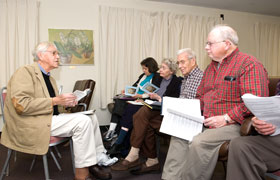  |
| HOME | THIS ISSUE | CALENDAR | GRANTS | BACK ISSUES | < BACK | NEXT > |
Opportunities for learning enrich the lives of retireesby Karen Singer - November 13, 2006 |
||||
| Retirees in search of intellectual stimulation can tap into two programs supported by the University. The Center for Learning in Retirement (CLIR) is Storrs-based; the Adult Learning Program (ALP) serves Hartford-area residents. Both are membership organizations offering mini-courses and seminars on a variety of subjects, strictly for learning enrichment. No credits. No tests. UConn's Center for Continuing Studies handles administrative functions for each group. The University provides meeting space for the CLIR in Windham cottage at the Mansfield Depot campus but not for the ALP, which meets at the Seabury Retirement Community in Bloomfield. Seabury gives members classrooms, meeting space, and the use of equipment, in exchange for offering its residents a discount on tuition fees. Here's a closer look at both programs. Center for Learning in Retirement "There was a group at Harvard originally affiliated with Elderhostel (the educational travel tour organization) and our associate dean of continuing education, Morris Fried, invited them to speak to us," recalls Elliot Wolk, a math professor who became a founding member of the UConn group that formed after that meeting. CLIR's purpose is "to provide meaningful and serious intellectual activities for retired men and women from all walks of life, conducted in an informal and relaxed atmosphere." The group has nearly 300 members, primarily retired professionals living in the Storrs area. Two-thirds are women. "I think it's important for us to be doing both physical and mental exercise," says CLIR president Mary Rogers, a retired Eastern Connecticut State University astronomy professor. The sessions typically contain seven to 12 mini-courses lasting two to 10 weeks and some special events. In addition to a $25 annual membership, there's a $12 per session fee, which allows you to take as many classes as you wish. Retired UConn modern languages professor Gene Barberet, a long-time CLIR member, sees the academic offerings as "a wonderful way of getting an introduction to a discipline. "Then you can go on and develop it all you want," he says, "which I have done time and again." Wolk, an octogenarian, heads CLIR's curriculum committee, lining up volunteers to lead several academic sessions each year. Perennial favorites include "The Memoir Writing Club," and "Exotic and Educational Travel," where members show slides taken on trips. "We try to work in science courses," says Wolk, "but they're not so popular." Among this year's fall offerings are "Notable Ninths," an exploration of Ninth symphonies by Beethoven, Schubert, Mahler, and other composers, taught by Bruce Bellingham, a UConn professor emeritus of music; "The Book of Genesis," which Wolk teaches; and "Entangled Minds and Matter," an examination of how humans relate to the environment, presented by David Lindorff, a Jungian analyst and UConn professor emeritus of electrical engineering. Special events include "Health Care Issues in Aging," with state senator Edith Prague; and "Stewards of God's Earth," with retired United Methodist minister Donald Hoyle.
Wolk says "Classical Foreign Film" and "The Greatest Speeches from Shakespeare" will be offered during the forthcoming winter session. The group doesn't have many dropouts, but, says Wolk, "people move away or pass on. We always need new blood." For more information, call 860-486-3231. The Adult Learning Program Initially sponsored by the Hartford Consortium of Higher Education, the group became sponsored by UConn about nine years ago. ALP offers seminars, special events, and field trips during fall, winter, and spring sessions. Its mission is "to promote the advancement, education, and communication of the economic, civic, cultural, and social interests of our adult community." The 150 members are mostly retirees with backgrounds in such fields as teaching, business, and medicine. "They are universally in it to keep their minds alive and be in touch with people who are also interested in that," says ALP co-chair Mary Ann Watson. "Most of our courses are led by members." Fall 2006 seminar offerings include "Dances We Love," "Identity Theft," "The Soul of India," and "Movie Buffs," a discussion series lead by the director at Trinity College's Cinestudio. There also is a "Fall Hike" seminar, and special events such as a visit to the new Foodshare distribution center in Bloomfield and a trip to the New Britain Museum of American Art. "We try to add several new things each term," Watson says. "This year we added four sessions on medical care for major illnesses presented by Hartford Hospital specialists, and seminars on string quartets and four contemporary poets." Winterterm, a two-week session running in January and February 2007, will focus on "The Food We Eat" and "The History of Food." ALP is still affiliated with Elderhostel, as one of its Lifelong Learning Institutes. Annual ALP dues are $90, or a semi-annual membership fee of $45 each for the fall/winter or spring/summer session. "Winterterm" costs $10. ALP has office space at UConn's West Hartford campus, with Internet and e-mail access. The group publishes a quarterly newsletter and has a website. Watson often asks religious leaders in the area to suggest ALP to "people who have lost a spouse or have just retired. "We welcome anyone who is interested in continuing to learn and enrich their life," she says. Call 860-570-9079 for more information. |
| ADVANCE HOME UCONN HOME |

